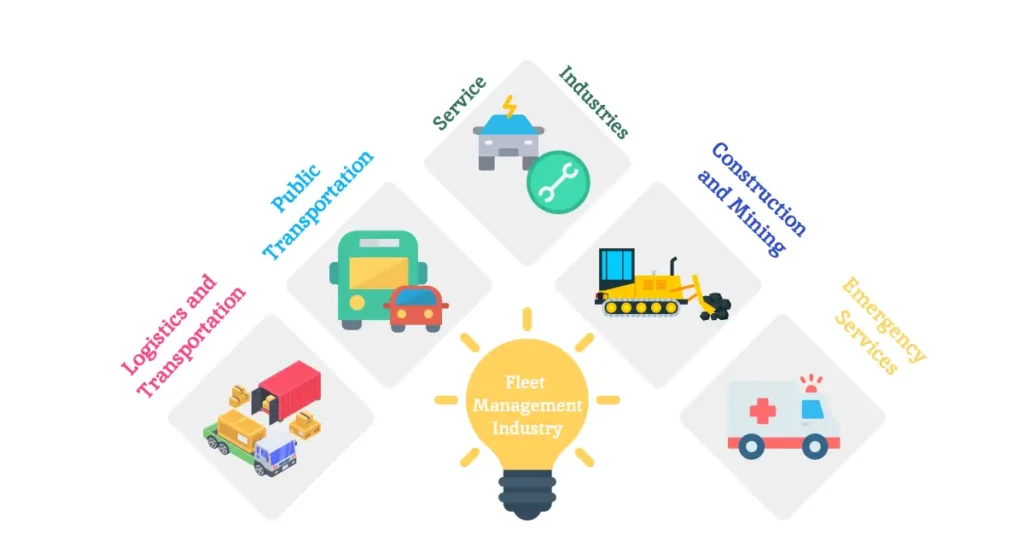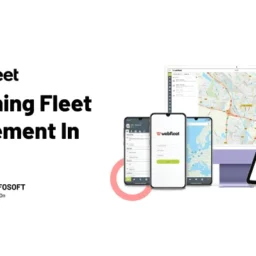
Table of Contents
What is Fleet Management?
Fleet management in 2024 is not like what we used to know as checking or managing vehicles and their upkeep only. It has been piloted into a relatively complex cognitive operation that involves a networked use of data analytics, automation, and active monitoring that seeks to optimize even the tiniest of activities within the fleet management and operation systems.
Modern fleet management is not limited to the purchase and supply of vehicles, their maintenance, and tracking. They included the integration of technologies like telematics, which allows for status tracking of vehicles in real-time, artificial intelligence in vehicle maintenance, and full solutions for fleet management that will tell from the driver cabin how the car is performing on the road, how the drivers are performing, fuel consumption, and others. Such tools help organizations make decisions based on the wealth of information they provide on optimizing operations while reducing costs and creating safe and sustainable environments.
Fleet management is one of the most important and strategic functions, especially for industries such as logistics and delivery services, public transport, and many other sectors. Companies are now considering how they can use technology to assist with scheduling simple tasks, maintenance, or even optimization of routes and gather more data about their business. This change makes it possible to implement subtle intelligent and interconnected means of managing the companies’ fleets in ways that could not be imagined in the past by avoiding frequent fixes and halts and decreasing the company’s effect on the environment.
Benefits of Fleet Management
For companies that currently run fleets or are planning to have one, it has been noted that for today’s rapidly growing business, having a fleet management system is not simply desirable but necessary. Companies that employ means of transport in their operations need to have a proper fleet management system to increase efficiency, assign the best route, save on fuel, and maintain vehicles for higher productivity and profit.
1. Operational Efficiency
Fleet management enables its use to be made more efficient, thus minimizing the time that any particular vehicle spends without being utilized. This can be useful in cutting costs of transport by identifying the shortest possible routes to travel, getting the most efficient fuel consumption rates, and eliminating unnecessary distances.
2. Cost Reduction
There are many ways that good fleet management reduces operating costs, including fuel management, vehicle maintenance, and purchasing, among them. Therefore, by following fleet performance and conducting a detailed analysis, businesses will be able to determine ways in which they can cut their expenses.
3. Enhanced Safety
Fleet management systems track the behavior of a driver, the mechanical condition of the vehicle, and even the adherence to safety standards. This goes a long way in minimizing cases of accidents; safe roads are attained, and legal suits are prevented, hence saving costs.
4. Regulatory Compliance
Keeping in mind the set guidelines of regulatory requirements is very essential. Implementing fleet management helps to check and monitor all the vehicles and make sure that they are properly and, most importantly, legally manageable, hence preventing cases of fines and penalties.
5. Improved customer satisfaction
Fleet management contributes the following effects: Delivery of goods and services is done effectively, hence satisfying the customers. Reliable services are provided, thus leading to effective communication with customers. This enhances the sales, and the goodwill of the business is also created since the customers are satisfied.
6. Environmental Impact
Sustainability initiatives can also be made in the context of fleet management for more efficient consumption of fuel, improvement of routes, maintenance, and the overall use of environmentally friendly vehicles.
What Does a Fleet Manager Do?
A fleet manager takes charge of handling and overseeing a company’s vehicle supply. The key roles include:
1. Vehicle Acquisition and Disposal
Selecting and acquiring vehicles for business use, leasing them, and disposing of those that are obsolete or low performers within the business.
2. Maintenance and Repairs
Make sure that all the vehicles are prone to regular service and repairs so as not to break down at least last longer.
3. Fuel Management
Measuring fuel usage and planning and helping to eradicate fuel wastage through proper management of its consumption by trying to cover the least distance in delivery.
4. Driver Management
Employee attraction and acquisition, staff development and management of transportation people, observation and control of their work, and checking compliance with legal requirements.
5. Compliance and Documentation
The management of all requisite documents and guarantee that all vehicles of the fleet are following all legal and other requirements.
6. Data Analysis and Reporting
When it comes to decision-making, real-time data is attained with the help of the software for the tracking of the fleet and assessment of its performance, fuel consumption, and other factors.
Bonus Tip
If you have good experience managing fleets and fine skills in how and where to manage fleets efficiently, you start your own fleet management company. By tapping on your knowledge skills as well as your management skills, the opportunity to earn monetary returns can be achieved through the effective management of third-party fleets and the offering of added services to customers. This business opportunity enables you to exercise your abilities and knowledge and meet the demands of companies that require effective and competent fleet management services.
Who Utilizes Fleet Management?
Fleet management is crucial for industries like logistics, transportation, delivery, public transport, construction, emergency response, and field services. It helps enhance productivity, and safety, reduce costs, and ensure legal compliance.

- Logistics and Transportation
- Public Transportation
- Service Industries
- Construction and Mining
- Emergency Services
What is Fleet Management Software?
Fleet management software is an IT solution dedicated to assisting fleet managers in observing, analyzing, and controlling a fleet of vehicles. But how does fleet manager software work? it includes some basic features, such as:
1. Vehicle tracking and telematics
Services that include real-time tracking form the basis of tracking the position, speed, and route of vehicles, allowing for more effective planning of routes and tracking of driver behavior.
2. Maintenance scheduling
Simplifies the process of detailing the schedule for the periodic maintenance and/or check-ups of the vehicular fleet, which may reduce the chances of frequent vehicular breakdowns and increase the useful life of the fleet.
3. Fuel Management
Records the amount of fuel used and assists in pinpointing situations where fuel expenses can be cut by improving drivers’ behavior behind the wheel and using more efficient routes for traveling.
4. Reporting and Analytics
Creates reports about the various characteristics of the fleets—usage of fuel, costs of maintenance, and behavior of drivers among them.
5. Compliance Management
Makes sure that all the vehicles meet the requirements of the industry as per the inspection dates, licenses, and any other relevant papers.
The basic features of fleet management software have evolved significantly in today’s reality. If you’re looking to develop new software or learn about fleet management, it’s essential to be aware of 9 key things about fleet management software.
Trends for Fleet Management in the Future
The area of operation of fleet management is dynamic, and this is due to the dynamics in the operational technology as well as the constantly changing marketplace. Some of the future trends include:
1. Electric Vehicles (EVs)
In the current global transition to sustainable energy, the application of electric vehicles in fleets is believed to rise. He explained that the aspects of charging infrastructure for electric vehicles and battery health management will become the responsibility of fleet managers.
2. Autonomous Vehicles
The application of this kind of technology could embody self-employing cars into fleets, which may cut down on human resource costs and increase safety. Well, the implications shall be that fleet managers are going to need to navigate through this new technology and adapt to it.
3. AI and Big Data
The increasing use of advanced artificial intelligence and big data analytics will impact all aspects of fleet management. This includes predicting maintenance needs using machine learning algorithms integrated into vehicle systems, optimizing routes, and making data-driven decisions based on analyzed big data.
4. IoT Integration
The Internet of Things (IoT) will enable more intelligent and interconnected fleets, as vehicles will communicate directly with one another and with a central system.
5. Sustainability Initiatives
The industry will experience growth in sustainable operations as more fleets switch to using alternative green fuels, employ fuel-efficient routes, and practice environmentally friendly operations.
Not Sure Where to Start? Contact Celestial Infosoft

With over 8 years of experience in developing the most advanced software for fleet management for various businesses, Celestial Infosoft stands as a premier software development partner. Instead of merely offering software as a product, we are a close-knit team that collaborates with clients to provide them with effective and sophisticated solutions to improve their fleets’ outcomes.
In case you are seeking to optimize and strengthen the fleet management of your company using the most advanced software, please contact us now. We believe you should not have to do it alone, and we want to assist you in pushing your fleet management to the following level.
Frequently Asked Questions ( FAQ )
What is fleet management, and why is it important for Business?
Fleet management is, therefore, a general concept that encompasses the management processes of commercial vehicles as well as the efficient utilization of commercial vehicles in business activities. These functions may range from but are not limited to vehicle acquisition and maintenance, its tracking system, fuel, and the management of drivers. Fleet management is required since it helps an organization improve productivity, control costs, and minimize the risks associated with managing vehicles, among other impacts.
What are the key benefits of a fleet management system?
Fleet management benefits from providing and applying them encompass improved operations through the use of proficient routes and less downtime, cost savings from enhanced fuel management as well as preventative maintenance, safety through monitoring the conduct of drivers, and adherence to regulation. It also has the option of emissions reduction and fuel consumption, thus helping minimize the effects we have on the environment.
Who typically utilizes fleet management systems?
Many industries largely dependent on vehicle operations are seen to adopt this technology, such as logistics and transportation industries, delivery services, public transportation sectors, construction industries, emergency services, and other field service industries. These systems are beneficial for companies and organizations from these sectors as they enhance the productivity, safety, and effectiveness of the fleet.



